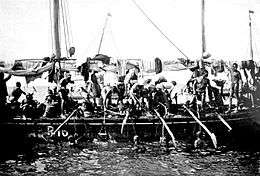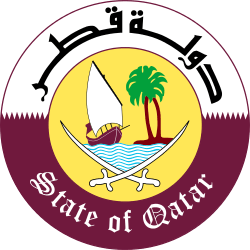Agriculture in Qatar
Agriculture in Qatar is inherently limited in scope due to the harsh climate and lack of arable land.[1] In spite of this, small-scale farming, nomadic herding, and fishing were the predominant means of subsistence in the region prior to the 20th century. Sea-based activities such as pearling and fishing served as the primary sources of income for Qataris until the commencement of oil drilling in 1939.[2]
Although the relative importance of these activities has declined as a means of livelihood (with commercial pearling disappearing completely), the government has attempted to encourage agriculture and fishing to provide a degree of self-sufficiency in food.[2] Never the less. One family owned company (Agrico ) has cut through and challenged the inviroment and started growing organic vegetables since 2012 all year long. Today Agrico is largerest vegetables producer in qatar. www.agrico.qa
History
Date palms were one of the earliest crops to be cultivated in the peninsula.[3] Beginning in the Bronze Age, the trading of date palms had a significant impact the Qatari economy.[4] Date palm leaves were also commonly used as a construction material.[5] Pearling was the main source of income for Qatar's inhabitants until the discovery of oil the 20th century. Pearl trading was supplemented in some areas by breeding camels. Fishing also played a role in the economy.[6]
| City | Fishing boats | Camels | Horses |
|---|---|---|---|
| Khor Hassan | 5 | 20 | 0 |
| Abu Dhalouf | 10 | 30 | 0 |
| Ar Ru'ays | 10 | 20 | 4 |
| Fuwayrit | 12 | 100 | 20 |
| Al Thakhira | 5 | 10 | 0 |
| Al Khor | 30 | 100 | 0 |
| Simaisma | 10 | 70 | 6 |
| Al Daayen | 10 | 60 | 10 |
| Lusail | 3 | 70 | 20 |
| Doha | 90 | 800 | 150 |
| Al Wakrah | 30 | 150 | 40 |
Cultivation and livestock

Only 2.5% (28,000 ha.) of the land in Qatar is arable or suitable for use as pastureland. This is a major increase from the two prior decades. In 1996, 8,312 ha. of land was arable, while in 1980 only 256 ha. was arable.[3]
Farming currently plays only a minor role in the economy. Of the 8,312 ha. of arable land in 1994, 2,345 ha. were used to cultivate permanent crops, while 5,987 ha. were used to grow annual crops. Date palms were the most abundant permanent crop.[3]
Between 1960 and 1970 agriculture grew. The number of farms, for example, increased fourfold to 411. Qataris who own agricultural land or properties generally hold government jobs and hire Pakistanis, or non-Qatari Arabs to manage their farms. The government operates one experimental farm. Of land under cultivation in 1990, about 48 percent was used for vegetables (23,000 tons produced), 33 percent for fruit and date production (8,000 tons), 11 percent for fodder (70,000 tons), and 8 percent for grains (3,000 tons). In 1990 the country had approximately 128,000 head of sheep, 78,000 goats, 24,000 camels, 10,000 cattle, and 1,000 horses. There are also dairy farms and about 2,000 chickens for poultry. All but 20 percent of local demand for eggs is met domestically. Despite the encouragement of agriculture and fishing, these two elements of the economy together produced only about 1 percent of the gross domestic product in 1989.[2]
Pearling
Pearling was the main source of revenue for Qatar until the discovery of oil in 1939.[8] Approximately 85 pearl beds exist in Qatar's territorial waters.[9] Historically, the season for pearl harvest was divided into 3 periods. Hansiyah lasted for 40 days and commenced in mid-April. Ghaus Al Kebir, the primary pearl diving season, took place from May to 10 September. Lastly, Ruddah occurred from late September to early October.[10] Sambuk, a type of dhow, was traditionally used for pearling trips. From the 18th to 20th centuries, the majority of pearls were exported to Mumbai where they would be classified and sent to European markets. The remaining yield would be sent to markets in Baghdad.[11]

| City | Number of boats | Number of men |
|---|---|---|
| Khor Hassan | 20 | 240 |
| Abu Dhalouf | 20 | 200 |
| Ar Ru'ays | 18 | 270 |
| Fuwayrit | 35 | 420 |
| Al Thakhira | 15 | 180 |
| Al Khor | 80 | 1200 |
| Simaisma | 50 | 600 |
| Al Daayen | 70 | 840 |
| Lusail | 9 | 90 |
| Doha | 350 | 6300 |
| Al Wakrah | 150 | 2550 |
Zubarah, a settlement on the northwest coast of Qatar, is one of the best preserved and most extensive pearling settlements in the region.[12] Reaching its climax in the 18th century, it was primarily an emporium and pearling settlement that capitalized on its proximity to pearl beds, possession of a large harbour and its central position on the Gulf routes.[13][14] After the introduction of the cultured pearl and the Great Depression in the 20th century, pearling ceased to be a viable option for many Qataris.[8]
Fishing
The Qatar National Fishing Company was incorporated in 1966 to fish for shrimp in territorial waters and to process catches in a refrigerated factory. Japan is a large market for Doha's commercial fish. The total catch of fish and other aquatic animals for 1989 was 4,374 tons.[2]
Limitations
Severe conditions, such as extremely high temperatures and lack of water and fertile soil, hinder increased agricultural production. Orthents, the predominant soil type in the peninsula, accounting for approximately 1,020,000 ha., are unfavorable for crop cultivation because of their extreme shallowness.[15] The limited groundwater that permits agriculture in some areas is being depleted so rapidly that saltwater is encroaching and making the soil inhospitable to all but the most salt-resistant crops.[2] The northern section of Qatar comprises the most significant source of fresh groundwater in the country, mainly due to the more advantageous hydro-geological conditions than those that exist in the southern section of the country.[16] The rate of groundwater extraction in 1966 was 20 mm3/year. This increased to 120 mm3/year by 2000. Studies have approximated that aquifer storage will be completely exhausted by 2025.[16]
References
- ↑ McCoy, Lisa (2014). Qatar (Major Muslim Nations). Mason Crest. pp. 69–71.
- 1 2 3 4 5 "Agriculture and Fishing". Country Studies. Retrieved 26 May 2015.
 This article incorporates public domain material from the Library of Congress Country Studies website http://lcweb2.loc.gov/frd/cs/.
This article incorporates public domain material from the Library of Congress Country Studies website http://lcweb2.loc.gov/frd/cs/. - 1 2 3 "Geography and population". Food and Agriculture Organization. Retrieved 13 July 2015.
- ↑ Althani, Mohamed (2013). Jassim the Leader: Founder of Qatar. Profile Books. p. 15. ISBN 978-1781250709.
- ↑ John Lockerbie. "Old buildings". catnaps.org. Retrieved 15 December 2015.
- ↑ "'Gazetteer of the Persian Gulf. Vol. II. Geographical and Statistical. J G Lorimer. 1908' [1532] (1647/2084)". Qatar Digital Library. Retrieved 26 July 2015.
- ↑ "'Gazetteer of the Persian Gulf. Vol. II. Geographical and Statistical. J G Lorimer. 1908' [1533] (1648/2084)". Qatar Digital Library. Retrieved 26 July 2015.
- 1 2 "Pearl Diving in Qatar". USA Today. Retrieved 26 May 2015.
- ↑ Al-Kubaisi, Mohammed Ali M. (1984). Industrial development in Qatar: a geographical assessment (PDF). Durham E-Theses, Durham University. p. 17.
- 1 2 Casey, Paula; Vine, Peter (1991). The heritage of Qatar (print ed.). Immel Publishing. p. 50. ISBN 978-0907151500.
- ↑ Casey & Vine, p. 52
- ↑ "Al Zubarah Archaeological Site". UNESCO. Retrieved 14 February 2015.
- ↑ Bowen R. Le B. 1951: The Pearl Fisheries of the Persian Gulf. In The Middle East Journal 5/2: 161–180.
- ↑ "The Pearl Emporium of Al Zubarah". Saudi Aramco World. December 2013. Retrieved 1 March 2015.
- ↑ Al-Kubaisi, Mohammed Ali M. (1984). Industrial development in Qatar: a geographical assessment (PDF). Durham E-Theses, Durham University. p. 15.
- 1 2 Llamas, M. Ramon; Custodio, E. (2002). Intensive Use of Groundwater: Challenges and Opportunities. CRC Press. p. 369. ISBN 978-9058093905.

